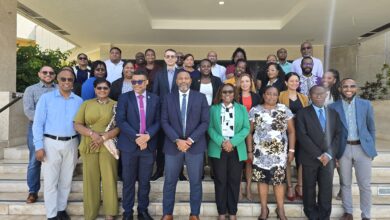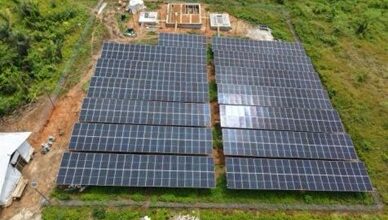After coming together for three weeks in The Bahamas and Barbados, representatives of Caribbean Youth have come up with a Vision for the Region in the 21st Century; four parliamentary resolutions and a Declaration and Regional Action Plan on Adolescent Sexual and Reproductive Health Rights.
The three-week Caribbean Youth Explosion which ended in Barbados on October 7, 1998, comprised three events organised by the CARICOM Secretariat, the Commonwealth Youth Programme (CYP) and the United Nations Population Fund (UNFPA). It began in The Bahamas on September 18 and saw more than 100 youths between the ages of 15 and 26 from 18 Caribbean islands and Canada participating.
A number of international and regional institutions including the Organisation of American States (OAS), the Inter American Development Bank (IDB), the United Nations Children’s Fund (UNICEF), the Inter-American Institute for Co-operation in Agriculture (IICA) and the University of the West Indies (UWI) also took part. The OAS, IDB, IICA, the Caribbean Development Bank (CDB) and the Caribbean Centre for Administrative Development (CARICAD) assisted financially while the Nassau Marriott and American Airlines provided special rates for the participants.
The Vision was moulded out of the Caribbean Youth Exchange which was organised by CYP and staged over the first10 days of the Explosion on the island of Eleuthera in The Bahamas. The Exchange focused on Healthy Lifestyles and encouraged the positive use of both mental and physical energies with a number of workshops and sporting activities.
The Vision was set within the framework of “Different Countries; Different Cultures; One Region; One Understanding among all segments of our Community; One Voice.” The young people said it was imperative that “our rights as equal, active and responsible participants be recognised as we enter the new millennium.”
In further expanding on the Vision for the 21st Century, the youths envisaged the society to be:
(i) A society which values genuine democracy, freedom, mutual respect and equal fundamental right which understands and believes in the ability of citizens to shape and change society in progressive ways; which affords citizens opportunities to make a meaningful contribution to development.
(ii) A society in which institutional infrastructure along with legal and administrative frameworks permit citizens access to resources, employment, education and training and making them fully aware of their rights and responsibility with a forum to promote their issues and concerns at the highest policy making levels.
(iii). A society free from discrimination because of age, class, race, religion, educational attainment, sexual orientation, gender, physical disabilities or other factors.
(iv) A society in which the citizens participate fully in the rejuvenation and maintenance of its cultural heritage and in which culture is a resource for everyday living.
(v) A society which is committed to achieving the goal of regional integration at the political, economic, cultural and social level as a means of promoting equitable development and the well-being of all Caribbean people.
(vi) A society which recognizes the interdependent relationship between human beings and the environment and is committed to the proper management of its resources.
(vii) A society which promotes healthy lifestyles and ensures that its citizens have easy access to the essential health information, services and facilities.
(viii) A society in pursuit of excellence striving to achieve freedom from all social ills.
The CARICOM Secretariat’s segment of the Explosion began on Eleuthera on September 28, with a two-day Workshop on Youth Participation in Civil Society which drew upon the discussions at the Exchange, refined the Vision and formulated resolutions for the order paper of the Youth Assembly of Caribbean Community Parliamentarians. The workshop also looked at ways of ensuring effective youth participation in the society in the 21st century; identified youth concerns and priority action areas; critically assessed Caribbean youth organisations and ways of equipping the organisations to face the challenges of the coming millennium.
The Assembly convened on October 1 in Nassau at The Bahamas House of Assembly and passed four resolutions on, Democracy, Equality and Participation; Education; Poverty and Economic Development and Health and Environment. All the resolutions were against the backdrop of the Vision for the 21st Century.
Prime Minister of The Bahamas, the Rt Hon. Hubert Ingraham was a surprise visitor to the Youth Assembly and advised the young members that the more familiar they could become with the parliamentary system the “better we will all be in the management of our societies.” he reminded them that Region had an enviable record in parliamentary democracy and was a trail blazer in deepening democracy.
The day before the Youth Assembly, Caribbean Youth Day, September 30, saw a specially staged cultural event and radio and television programmes featuring the youths of the different countries. The Bahamas’ High Commissioner to CARICOM, His Excellency Leonard Archer was the host of a luncheon and delivered an address in which, among other things, he called for acceptance of the notion of the right of CARICOM citizens to live and work within the Community.
The UNFPA’s Caribbean Youth Summit on Adolescent Sexual and Reproductive Health Rights followed The Bahamas activities and was staged at the Sherbourne Centre, Barbados and opened on October 5 before His Excellency Governor General Sir Clifford Husbands, acting Prime Minister the Hon. David Simmonds, CARICOM Secretary-General Mr Edwin Carrington and Executive Director of the UNFPA Under Secretary-General Dr Nafis Sadik.
The Declaration at the conclusion of the Summit stated inter alia: That adolescents and young persons should have access commensurate with their level of physiological and psychological development, to proper information and education on their rights and responsibilities concerning: fertility regulation; health, developmental and life threatening risks of early and unprotected sexual behaviour, responsibilities for self as well as for their partners.”
They should also have other options including the exercise of discipline, self-esteem and self control through and including abstinence and non-sexual expression of affection to one another.
In the preamble to the Regional Action Plan (RAP) the youths expressed concern that in the move to facilitate easier access to reproductive health services by young persons, the option of abstinence appeared to have been marginalised. They further stated that disproportionately little attention was paid to guiding and empowering many of them to choose abstinence as an option.
The preamble further stated that youth involvement and multi-sectoral collaboration were key to success, and should be at the heart of the post Summit thrust. Further, programmes which named young people as beneficiaries, must be designed with young people fully recognized as partners and consultants.
The youths issued a call for more fora such as those provided by the Explosion to give young people the right to make decisions and take appropriate action, with the partnership of and guidance from their parents, religious community, governments, health, and education sectors.
“We consider such partnerships important because of the extent to which well meaning agencies and governments are conducting isolated and overlapping interventions, with limited success,” The preamble stated.





